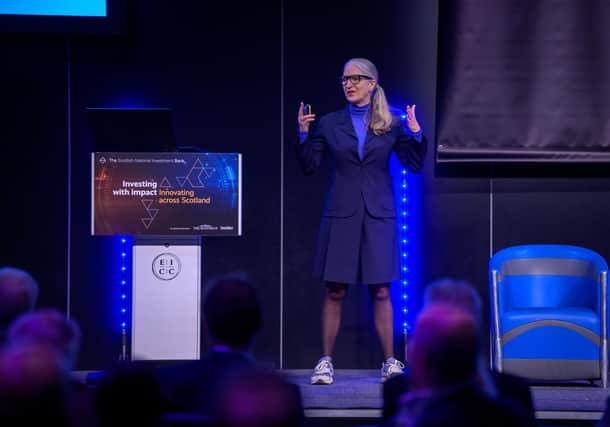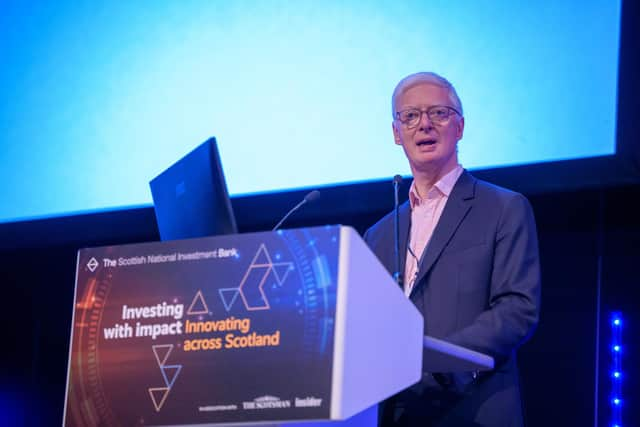Scottish National Investment Bank: investing in people and the planet


More than 230 delegates attended the Scottish National Investment Bank’s annual flagship conference earlier this month to hear from a variety of speakers on the topic of Investing with Impact: Innovating Across Scotland.
The full-day event at the Edinburgh International Conference Centre (EICC) on Monday, 4 March, in association with The Scotsman and Insider Media, brought together representatives from the Bank, organisations involved in delivering projects with a positive impact, and experts on investing for the collective good.
Since its launch in 2020 the Bank has committed direct investment of £518 million to help create a “stronger, fairer and more sustainable” Scotland. A further £824m has been attracted from other sources, meaning the Scottish economy has benefited to the tune of £1.3 billion.


Al Denholm, chief executive of the Bank, told the EICC audience: “All of our investments must meet the aims of at least one of our three missions – to support Scotland on its journey to net-zero, improve places and communities, or to harness innovation.
“Of course, many of our investments cross into more than one of those missions.”
Denholm referred to the Bank’s paper, A Just Transition: Putting People First, which was launched on the day of the conference, explaining: “As we move away from an energy sector that is dependent on fossil fuels to greener, renewable energies, a ‘just transition’ is one where we actively build opportunities to create a fairer, more prosperous economy that puts people and planet first, ensuring that no-one is left behind.”
The Bank’s new strategy document presents the scale of the just transition opportunity. With the offshore energy industry representing almost one in every 200 UK jobs – and around one in 30 inScotland – the paper states the sector has a critical role to play in leading the transition to a lower carbon future. It says up to 225,000 direct and indirect offshore energy jobs could be created by 2030, up from around 154,000 today.
Conference keynote speaker was futurist and visionary thinker Anne Lise Kjaer, who created the 4P Model of People, Planet, Purpose and Performance to guide clients, including the BBC and UNICEF, in their strategy and vision work.
She told delegates why curiosity, creativity and collaboration matter in achieving good impacts, saying: “Short-termism is one of the greatest challenges facing communities and the whole planet.”
She supported this point with research findings that 40 per cent of chief executives agree short-term shareholders are the greatest threat to corporate values.
Kjaer went on to share case studies and other examples to help individuals think about the future in a positive way that balances people and planet. These included civic investment in the Canadian city of Calgary, Rick Rubin’s book, The Creative Act: A Way of Being, and Finland being named the world’s happiest country.
In her summing up, Kjaer said her four key takeaways are to be the human interface, build multi-staker alliances, inspire legacy thinking, and invite meaningful dialogue.
Later in the day, Willie Watt, Scottish National Investment Bank chairman, had an insightful fireside chat with Simon Keegan, a UK business editor at Insight Media.
Watt said: “As impact investors, we can demonstrate that capitalism can be part of the solution to societal problems. “We seek deliverable change within the companies we invest.”
The development of well-paid jobs is something the Bank regards as “incredibly important” in an investee’s plans, as is innovation that creates wealth to be circulated in local communities.
Speaking about the one thing he wanted delegates to keep in mind, Watt told the conference audience: “I’d like people to be excited about what companies in Scotland are doing… with an enthusiasm and excitement about what can be achieved in Scotland.”
Innovations with impact
Panel sessions and fireside chats at the Scottish National Investment Bank’s Investing with Impact: Innovating Across Scotland conference covered a range of topics, including communities, funding innovative models, diversity and net-zero.
The first panel session of the day, chaired by Insider Media group editorial director Miri Thomas, focused on “transforming communities so people can thrive”, with Gavin Rodgers, CEO of Lothian Broadband Network; David Whiteford OBE, group chairman of Highland Coast Hotels; Susan Aktemel, founder of Homes for Good, and Stephen Muers, CEO of Big Society Capital.
They explained how their organisations play a role in transforming communities, with Whiteford saying its seven hotels on or around the North Coast 500 route are used by local people and groups, as well as tourists, to help stimulate entrepreneurship and create employment opportunities.
Rodgers said Lothian Broadband Network had used investment from the Bank to improve internet access in remote Highland communities, which can help tackle the issue of depopulation.
Aktemel explained that a key question in impact investment should be to ask: “How does your business make people’s lives better?” And Muers described his areas of focus, including opportunities around investing in “tech for good”, an area in which Scotland has achieved success.
During the first fireside chat of the afternoon, Simon Forrest, CEO of Nova Innovation; Clare Wareing, CEO of Cumulus Oncology, and Phil Chambers, CEO of Orbex, discussed funding innovative models to drive productivity.
On the question of supporting entrepreneurship, Wareing said that while Scotland does this relatively well, there is room for improvement and pointed to “successful ecosystems”, such as San Francisco and Boston.
Forrest said that Scotland is fortunate in having the natural resources for tidal power and that he has found Edinburgh good for hiring staff, with the firm offering flexible ways of working which is important in attracting the right talent.
Chambers said: “Part of the key to having a successful business is starting at the right time.”
The Pathways Forward panel involved Ana Stewart, chair of Pathways Forward, Anne Lise Kjaer, Lucinda Bruce-Gardyne, founder of Genius Foods, and Elaine Van Der Berg, CEO of Pufferfish. The Pathways report published just over a year ago was an independent review into women in entrepreneurship in Scotland.
Stewart said there is a need for more to be done on diversity, with only one in five businesses in Scotland being female-led. Actions as a result of the report included the launch of Pathways Pledges that organisations – including the Bank – have signed up to.
Bruce-Gardyne called on school pupils to have the opportunities to get involved in entrepreneurship programmes, and for boys and girls to be encouraged to listen to each other and be respectful in discussions.
Van Der Berg said people should be encouraged to have the confidence to be entrepreneurs. She added that “empowering women” is important, for example, by showcasing examples of successful female-led firms.
Looking ahead at addressing the gender gap, Kjaer said: “We have to be more inclusive…We need to bring that system change to mindset and culture.”
The final panel session of the day focused on the net-zero challenge, chaired by Jacqueline Redmond, a non-executive director at Scottish National Investment Bank, who started by asking what has helped and hindered organisations.
Ian Mackenzie, CEO of Trojan Energy, said it can be a challenge to get workers to move from the relatively well-paid oil and gas sector to clean tech. Roy Stenhouse, chief impact officer at the Net Zero Technology Centre, said a challenge could be finding “patient capital”. Kathleen Goldie, commercial director of SNDC, added that data is a big part of the transition. And Richard Knox, CEO of Verlume, said the oil and gas skillset, including experience of working in harsh environments. was valuable.